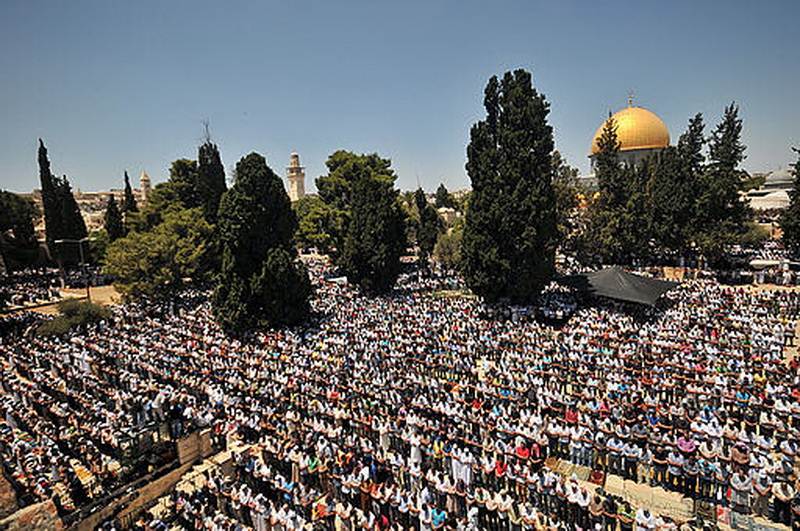Islamic Editorials, February 17, 2010
Al-Jazeerah
Islam:
Table of Contents
I. Introduction:
Basic Information
1.
Islam: A Brief Introduction
2.
Three Levels of Faith: Islam, Iman, and Ihsan
3.
The Scientific Evidence That God Exists and the Holy Qur'an Is His
Message to Humanity
4.
Creation and Evolution in the Holy Qur'an
5.
Humans, As God's Caliphs on Earth
6.
Adam's Contest With the Angels, and Getting Out of Paradise
7.
Worshippers By Choice Or Forced Slaves?
8.
The Relationship Between the Spiritual and the Physical
Aspects of Islamic Teachings
9. Mind, Self, Soul, Spirit, and Happiness from an Islamic Perspective
10.
Heart-Mind Relationship in the Holy Qur'an
II. Islam: The
Five Pillars of the Faith Structure
11. Islamic Proclamation of Faith
12. Performing Islamic Prayers
13. Giving Zakat,
Charity, The Third Islamic Duty
14. Fasting and
Ramadhan, Great Gifts from Allah to Muslims
III. Iman:
Allah, His Angels, Messengers, Messages, Latter Day, and Qadar
16.
Allah, As He Described Himself in the Holy Quran
17.
Angels
18.
Noo'h, Noah, in the Holy Quran
21.
'Eissa, Jesus Christ, in the Holy Quran
22.
Muhammed in the Holy Quran
23.
Prophet Muhammed's Night Journey and Ascent to Heavens, Al-Issra Wal
Mi'raj
24. The Last Day, The Hour, Resurrection, Reckoning, and Judgment
25. God's Precise Measurement and His Just Decree, Al-Qadar Wal Qadha
IV. I'hsan:
Watching Allah in What We Say and What We Do
2. The No (La) Commands
3. The Imperative Commands
Articles with Islamic
Perspective:
Health Care Crisis in
the US: An Islamic Perspective
"Terrorism" & "Islamo-Fascism"
Propaganda Campaigns:
An Interactive
Lecture
Six Questions About
Islam, Muslims and Jews
Food Islamic Rules
and Teachings
|
|
Islam:
God's Message of Guidance to Humanity
ãöäú
ÞöÕóÇÑö ÇáÓæøóÑö ÇáÊí ÊõÊúáóì ÈóÚúÏö ÇáÝÇÊöÍóÉö Ýí ÇáÕáÇÉö
ÊÑÌãÉ ÍÓä Úáí ÇáäÌÇÑ
Some Short
Suras to Be Recited After Al-Fati'ha in Prayer
ÓõæۡÑóÉõ ÇáÇٕÎáÇÕ ÈöÓۡãö ٱááåö ٱáÑøóÍۡãóÜٰäö ٱáÑøóÍöíãö
ٱááøóåõ ٱáÕøóãóÏõ (٢)áóãۡ íóáöÏۡ æóáóãۡ íõæáóÏۡ (٣)æóáóãۡ íóßõä áøóåõ ۥ ڪõÝõæðÇ ÃóÍóÏõۢ (٤)
Surat Al-Ikhlas
Bismila hir ra'hma nir ra'heem
1. Qul
hu allahu
a’had
2. Allahus
Samad
3. Lam
yalid
wa
lam
youlad
4. Wa
lam
yakun
lahu
kufwan
a’had
Surat Al-Ikhlas
Allah, the Eternal; (2)He did not beget (give birth) and He was not begotten (given birth to); (3)And there has never been anyone equal to Him. (4)
ÓõæۡÑóÉõ ÇáÝóáóÞ ÈöÓۡãö ٱááåö ٱáÑøóÍۡãóÜٰäö ٱáÑøóÍöíãö
Þõáۡ ÃóÚõæÐõ ÈöÑóÈøö ٱáۡÝóáóÞö (١) ãöä ÔóÑøö ãóÇ ÎóáóÞó (٢) æóãöä ÔóÑøö ÛóÇÓöÞò ÅöÐóÇ æóÞóÈó (٣) æóãöä ÔóÑøö ٱáäøóÝøóÜٰËóÜٰÊö Ýöì ٱáۡÚõÞóÏö (٤)
æóãöä ÔóÑøö ÍóÇÓöÏò ÅöÐóÇ ÍóÓóÏó
(٥)
Surat Al-Falaq
Bismila hir ra'hma nir raheem
1. Qul a‘a-oudhu
birabil falaq
2. Min sharri
ma khalaq
3. Wa min
sharri ghasiqin
idha
waqab
4. Wa min
sharrin
nafathati fil
‘uqad
5. Wa min
sharri hasidin
idha
hasad Surat Al-Falaq In the name of Allah, the Beneficent, the Merciful
Say: I seek refuge with the Lord of the dawn (daybreak), (1)From the evil of things He created; (2)And from the evil of night darkness as it overspreads; (3)And from the evil of tied knots (of witchcraft or plots); (4)And from the evil of the envious when he envies. (5)
ÓõæۡÑóÉõ
ÇáäøóÇÓ ÈöÓۡãö ٱááåö ٱáÑøóÍۡãóÜٰäö ٱáÑøóÍöíãö
Þõáۡ ÃóÚõæÐõ ÈöÑóÈøö ٱáäøóÇÓö (١)ãóáößö ٱáäøóÇÓö (٢)ÅöáóÜٰåö ٱáäøóÇÓö (٣)ãöä ÔóÑøö ٱáۡæóÓۡæóÇÓö ٱáۡÎóäøóÇÓö (٤)ٱáøóÐöì íõæóÓۡæöÓõ Ýöì ÕõÏõæÑö ٱáäøóÇÓö (٥)ãöäó ٱáۡÌöäøóÉö æóٱáäøóÇÓö (٦) (ÇáäÇÓ ¡ 114: 1-6).
Surat An-Nas (Al-Nas)
Bismila hir ra'hma nir ra'heem
1. Qul ‘a-oudhu
birabin nas
2. Malikin nas
3. Ilahin nas
4. Min sharril
waswasil khannas
5. Alladhi
yuwas wisu
fi sudourin
nas
6. Minal jinnati
wannas Surat An-Nas (Al-Nas) In the name of Allah, the Beneficent, the Merciful
Say: I seek refuge with the Lord of the people (humankind), (1)King of the people (humankind), (2)God of the people (humankind), (3)From the evil of the whisperer (the devil), the silent (who shuts up when people remember God by reciting these verses and others from the Holy Quran) (4)Who whispers into the hearts of the people (5)(Both) the Jinns and the people (humans). (6) |
(jinns are invisible non-human creatures)
================================
* Background to the transliteration of Arabic sounds:
There are three Arabic vowels and their three strong forms (Tanween, i.e. adding "N"). The first is the Fat'ha, which maybe expressed in English by the sound / a /, with its strong form of / an /. The second is the Kassra, which maybe expressed by the sound / i /, with its strong form of / in /. The third Arabic vowel is the Dhamma, which maybe expressed by the sound / u /, with its strong form of / un /.
Following Arabic grammatical rules, a common name such as "Ahmed" (or Ahmad) maybe written and pronounced as Ahmada, Ahmadan, Ahmadi, Ahmadin, Ahmadu, and Ahmadun.
While all these six vowel forms are written in the Arabic text of the Holy Quran, not all of them are pronounced in recitation, particularly at the end of each verse. However, they maybe pronounced when several verses are continuously recited.
Arabic written words are mainly composed of consonants, vowels are added as symbols over or under a letter, as in the case of the text of the Holy Quran. However, in books and written media, only basic consonants and essential vowels are written as letters. No vowel symbols are added, as it is expected from an average educated Arabic speaker to know how to pronounce the words without vowel symbols.
Underlined letters in the Quran transliteration
Some Arabic letters and sounds have no counterparts in the English alphabet and the English phonetic transcription. There are nine Arabic sounds which have no equivalence in the English alphabet. These are ( Í Î Õ Ö Ø Ù Ú Û Þ ). Some translators underline the closest English letters to these Arabic letters, in order to tell readers that these are pronounced differently in Arabic. The closest sounds expressing the Arabic letters in parentheses, from right to left, are ( h, kh, s, dh, t, tdh, a, gh, q ). However, underlining them as ( h, kh, s, dh, t, tdh, a, gh, q ) conveys the message that these are different from the English sounds expressed by the letters of the English alphabet.
The two Arabic letters and sounds of Tha ( Ë ) and Dhal ( Ð ), expressed by the two English letters "th" at the beginning of the English words "three" and "that," are transliterated as / th / and / th /, respectively.
This author uses this same method of underlining these letters, with the exception of the two Arabic letters expressed by the / h / and / a / sounds. Instead of underlining them, he adds an apostrophe before the letter to become / 'h / and / 'a / respectively. Using an apostrophe instead of underling a letter is for practical reasons only. First, these two letters are more frequently used than the other letters in the list. Second, it is easier to use the apostrophe on keyboards than adding underlining after writing.
As an example, an apostrophe is used before the English letter / a / to express the eighteenth letter of the Arabic alphabet / 'ayn /, as in the case of translating the Good Name of God, Al-'Azeez, the tenth on the list.
An apostrophe is also used before the English letter / h / to express the sixth letter of the Arabic alphabet / 'ha /, as in the case of translating the Good Name of God, Al-A'had,
====================================
* Dr. Hassan
Ali El-Najjar has a Ph.D. in Sociology and a Master’s degree in Cul


